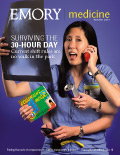Burning the midnight oil
 |
Remember those all-nighters in medical school and those seemingly endless shifts as a resident? At times, you felt emotionally exhausted and disconnected.
For some, those feelings were anything but temporary. Studies have confirmed that many residents experience burnout. But new research is pointing to the conclusion that burnout may begin in medical school.
Emory emergency medicine physician Sally Santen surveyed 249 medical students several years ago at Vanderbilt University. At that time, Vanderbilt had a traditional medical curriculum—classroom lectures first and second years and clinical work beginning in year three. (Since then, Vanderbilt and Emory have implemented new curriculums that get students in front of patients their first year.)
She found that 21% of first-year medical students experienced moderate or high burnout. But burnout peaked in the second and third years of medical school.
More recently, Santen surveyed 105 Emory medical students during their second year, and while data are preliminary, overall she found fewer Emory students experienced burnout than their previous Vanderbilt counterparts. For example, 26% of Emory medical students experienced depersonalization, compared with 57% at Vanderbilt in the old curriculum.
Preventing burnout is about maintaining balance, Santen says. Students should have solid support systems to act as a base to balance what she calls “life’s seesaw.”
Preventing burnout was one topic addressed in a new guide for first-year medical students.
Emory’s medical school gave each first-year student a copy of A Guide to Medical School Success, written by Emory faculty.
The booklet offers advice ranging from how to study to building concentration and memorization skills to managing time and priorities.
The idea for the booklet came from Bill Eley, the medical school’s executive associate dean for medical education, and the staff of the Benjamin Franklin Academy, a private high school in Atlanta. The academy has been assisting medical students and residents with learning problems. Eley and the academy’s staff thought all first-year students could benefit from the recommendations.
“This is everything I wish I had known in medical school,” says Eley. “Students nowadays think they can multi-task. One student recently told me that he’s gone back to taking notes on paper, rather than on a laptop, since using the laptop proved to be such a distraction.”


